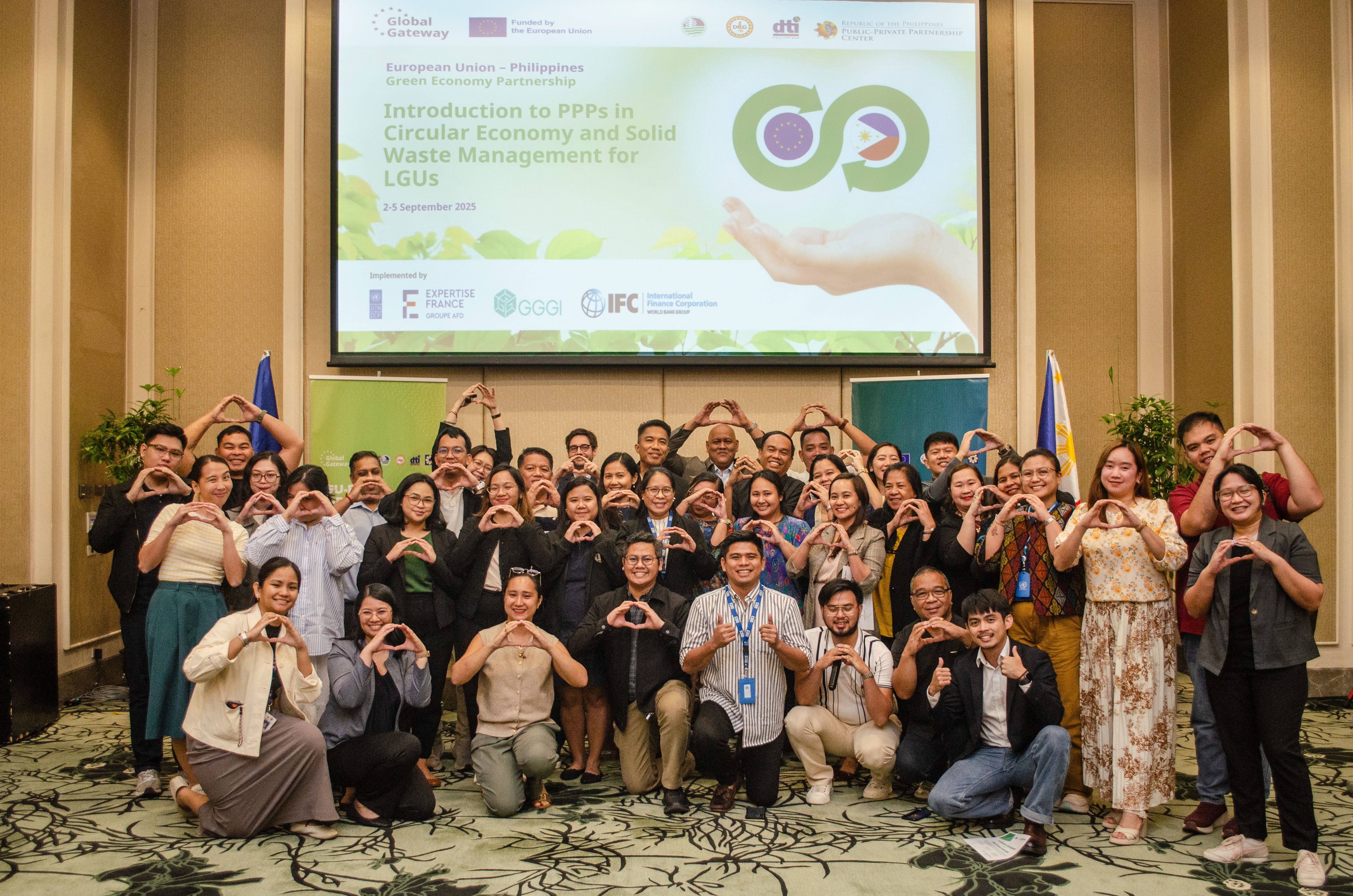Public-private partnerships (PPPs) took center stage in a training that equipped local government units (LGUs) with the tools to drive circular and green economy initiatives.
The training, organized by the Public-Private Partnership Center (PPP Center) of the Philippines and held on 2–5 September at Makati Diamond Residences, highlighted how PPPs can help municipalities and cities finance, design, and operate green infrastructure––particularly in solid waste––while sharing risks and leveraging private-sector investments. Eleven LGUs from across the Philippines (Albay, Baguio City, Quezon City, Puerto Princesa City, Quirino, Ormoc City, Iloilo City, Municipality of Del Carmen, Iligan City, Zamboanga City, and Island Garden City of Samal) attended the training.
This training is a crucial component of the European Union – Philippine Green Economy Partnership, made possible by the EU’s €60 million funding support and led by the Department of Environment and Natural Resources (DENR).
Creating bridges for circularity through PPPs
“We understand there is a need for further capacity building at the local government level to better prepare and manage PPP projects, as well as to strengthen local competencies in the key elements that make PPP arrangements successful, such as on project design, financial modelling, risk distribution, contract management, and, last but not last how to maximise benefits for your communities that the PPPs are intended to serve, while ensuring a do-no-harm approach,” stated Alix Wurdak, Programme Manager at the Delegation of the European Union to the Philippines.
She further highlighted the important role of the government in providing oversight of the PPP, emphasizing that strong local leadership and commitment are vital to the sustainability of such projects despite their complex nature. This is one of the reasons why the training is vital for local governments wishing to engage in PPPs.
“We hope that after this three-day workshop, you have gained a deeper appreciation for the PPP process—how to conceptualize PPP projects, identify them, and ideally develop them into full-scale feasibility studies with the aim of rolling them out and engaging the private sector in partnering and developing your PPP initiatives,” said PPP Center’s Project Development Service Assistant Director, Raphael M. Badillo.
Public-private partnerships are agreements between a public agency and a private sector partner to finance, design, maintain, and operate infrastructure development projects such as solid waste management systems. In PPPs, both parties share risks, and private investments are recovered through the performance of the project after turn-over.
“Equipping LGUs with practical tools to turn waste management challenges into real, workable projects, with the private sector as a partner, is a core objective of this training. It is more than just learning the PPP Code and its processes,” said PPP Center Assistant Secretary and Deputy Executive Director Eleazar E. Ricote.
Within the EU-PH Green Economy Partnership, PPPs can empower LGUs to locally implement and sustain circularity measures through private-sector support. The training provided an overview of PPP in the context of the Philippines – the institutional framework and its application in circular economy and solid waste management.
This also ensures a whole-of-systems approach, as emphasized by Moeko Saito-Jensen, Project Manager of the EU-PH Green Economy Partnership Specific Objective 2: Green LGUs from the United Nations Development Programme (UNDP), which includes building foundational waste and resource management systems, creating enabling and inclusive policies, strengthening capacities of local institutions, promoting behavioral change, advancing gender, disability, and social inclusion (GEDSI) models, piloting innovative business models, and mobilizing green financing.
“Our efforts today are part of the broader shift towards circularity. When aligned with SDG 11 (Sustainable Cities and Communities), SDG 12 (Responsible Consumption and Production), and SDG 13 (Climate Action), PPPs can help ensure that our waste management and circular economy initiatives are sustainable while leaving no one behind,” she further adds.
The training was coordinated by Expertise France and the UNDP. Expertise France, the lead technical partner implementing the programme’s actions towards the green transition of the Philippine private sector, ensures that the public sector is well-equipped to handle PPPs sustainably by providing technical support and financial support for the feasibility studies of select LGUs.
“The EU-PH Green Economy Partnership will help support the development of these solid waste management infrastructure and build capacities to ensure local governments are capable of sustaining the projects and boost circularity in the country, especially in their LGUs and at the community level,” said Marie-Maylis Charlat, Project Leader of the EU-PH Green Economy Partnership Specific Objective 3: Green Business, Infrastructure, and Finance.
Post-training, selected LGUs with plans to move forward with solid waste management PPPs will receive tailored support from Expertise France and UNDP to develop public-private partnership agreements.
For updates about the EU-PH Green Economy Partnership, go to https://www.greeneconomy.ph
-----
About the EU-PH Green Economy Partnership
Funded by a P3.67 billion (€60 million) grant from the European Union, the EU-PH Green Economy Partnership runs from 2023-2028 in collaboration with the government of the Philippines, led by the Department of Environment and Natural Resources. This priority programme of the European Union links European and Filipino partners from the private sector and local governments to foster a circular economy and the reduction of plastic waste. It also aims to improve energy efficiency and promote renewable energy use and climate change mitigation and adaptation.
Through technology transfers and investments, the programme aims to accelerate the transition to a greener economy while sustaining economic growth that benefits all Filipinos. The EU-PH Green Economy Partnership is co-funded by Germany's Ministry for the Environment, and implemented by Germany's development agency GIZ, UNDP Philippines, Expertise France with Global Green Growth Institute, and the International Finance Corporation – a member of the World Bank Group. The Green Economy Partnership is part of EU’s Global Gateway initiative – the European strategy engaging with partners globally and promoting investments around shared priorities such as the transition to a green economy and the advancement of digital infrastructure, among others.
